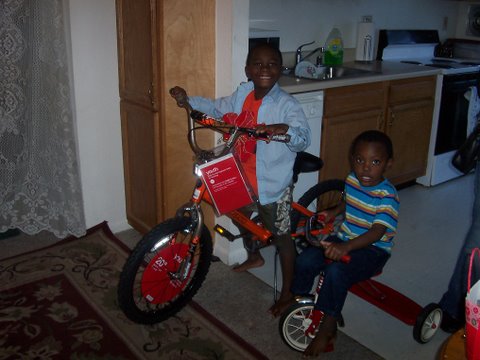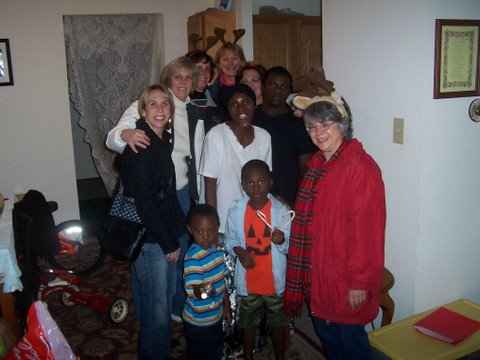Interfaith was first fostered in Fredericksburg though the efforts of Interfaith Community Council. Tom Faulkner was the first chair of the group in January 1973. Its goal was to communicate services and provide a means of communication among area church members. The Center operated in old City Police station. Key topics were discussions about halfway house for alcoholics and meals on wheels. They had both a canned goods pantry and a clothes closet and staffed by 11 churches. The group fostered the dolphin program and the School dressing day program
From 2005-2010 500 refugees came to Fredericksburg from Africa. Gay Rahn has said this was the origin of the interfaith emphasis a decade later
St. George first experience with a refugee family was in early 2006 by sponsoring the Tulay Family in Fredericksburg. They were originally from Liberia but fled the country due to war. They stayed 15 year in Sierra Leone and left that country due to conflict. The family was helped with clothing and household needs as well as $615 collected here.
The refugees were invited by the State Department and resettled by the Catholic Diocese of Arlington’s Office of Migration and Refugee Services. The U.S. Conference of Catholic Bishops, with advice from the state and regional resettlement office, sets the overall number of refugees placed here annually. But many factors go into the arrival dates and the demographics of families and particularly the latter is unknown until arrival
Fredericksburg was initially attractive due to lower rents than Northern Virginia, plentiful jobs, and churches that were ready to welcome them.
St. George’s support the refugee population in the Christmas offering in 2007 – 2/3’s to Micah and 1/3 to local refugees. At the same time St. George’s and members from other churches came together to celebrate a Thanksgiving dinner with the refugee population. Also in the fall was a program, “Refugees Among Us” featuring speaker Paul Niyungeko, a refugee from the Republic of the Congo.
Burundi became a topic in Christian Ed in 2008 and focus of church efforts with a number of refugees coming into the Fredericksburg area from that country.
We tended to interact with those from Burundi in Central Africa where many had spent years in refugee camps, particularly in Tanzania. . The fighting there pitted two ethnic groups, the Hutus and the Tutsis. They often came with little formal education and did not know how to use indoor plumbing, electricity or cars.
St. George’s bus was active in 2007-2008 with refugee pickup for 871 miles. In addition we drove 1,070 miles for English classes, driving from their houses to Fredericksburg Baptist for English as a Second Language Classes from January, 2007 to the end of May, 2008. Thanks to Billy Withers for his efforts. We also drove to the Health department. St. George’s also used the bus to bring the refugees to our Sunday services.
The most prominent refugee was 19 year old Jeanine Nyanzira who came in the latter half of 2006. She was resettled to a townhouse in Bragg Hill with her parents, five siblings and her two sons. St. George’s participated in furnishing it.
Individual parishioners played a role. Jack Creasy taught English to the refugees in 2008 and his wife Donna provided cooking lessons.
In Jan., 2010 we hired a refugee for the staff. Marian Mubangu She was a refugee from the Congo 5 years ago who had worked cleaning motel rooms. She stayed in that position until the end of January, 2014.
We supported the Imani Refugee Garden and Cultural Center from 2010-12. This garden supported ten refugee families with the opportunity to grow food, provide and enlarge skills, provide camaraderie and sell their crops at the Spotsylvania Farmer’s Market. They also moved into tutoring and literacy training at Bragg Hill
Munira Marlowe was the founder and Executive Director of IMANI Multicultural Center. She was born in Kenya and came to the United States in 1988 after graduating from a Seventh Day University in Kenya called Baraton – an affiliate of Andrews University in Michigan. By 2006, she accepted a job with the Catholic Diocese of Arlington as the Refugee Coordinator in Fredericksburg.
St. George’s in 2011 was involved in tutoring refugees. Meeting twice a week, teachers work one on one with their students teaching language, reading, and life skills.
During the summer of 2010 and 2011, St. George’s partnered with Trinity and Common Grounds Church to lead a week of summer camp for children who otherwise would have no access to camp. It was called Soks Camp (Sema, Ota, Kua, Soma or Speak, Dream Grow, Read). The camp, which includes a nutritious lunch, will focus on art this year and several local artists will participate during the week which will culminate with an art show at the England Run Library.
In partnership with BB&T and Fredericksburg Baptist we are involved in a new program for teens. Teens will spend a week learning how to be successful on the job; proper dress, good eye contact, and timeliness. Then the teens will be placed in a three week long internship, and paid.
Also in 2011-2012, St. George’s Outreach Literacy was formed to support a group of refugee women from Africa by providing one on one literacy tutoring. The group has bonded through experiences of everyday life in America i.e.… shopping for produce at Walmart, visiting local stores, and cooking. The produced a Thanksgiving dinner
The ECW provided gifts at Christmas.

A related program, The Refugee Sewing Program was formed. They looked to supply new or used sewing machines, basic sewing supplies (scissors, thread, sewing needles, etc.), fabric, yarn, knitting needles, and crochet hooks. The goal is to increase the ladies’ self-sufficiency as they learn to make craft items to sell and to learn how to make their own clothes
Overall by this time the refugee emphasis was dying down. However, by Feb., 2010, the church leaders asked the State Department to stop sending refugees here. The economy soured and churches felt they could no longer help the ones send here based on capacity. Capacity takes into account social services and nonprofits, schools, health departments and jobs. Refugees seemed to increase as jobs were drying up. There was also lack of communication with the Catholic Diocese as the refugee population was picking up.
